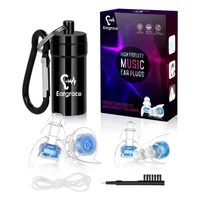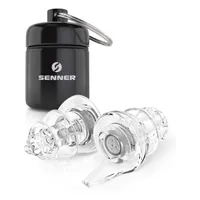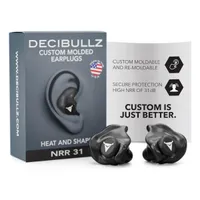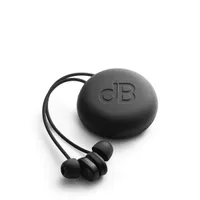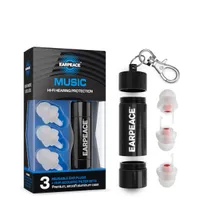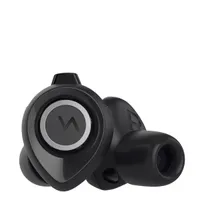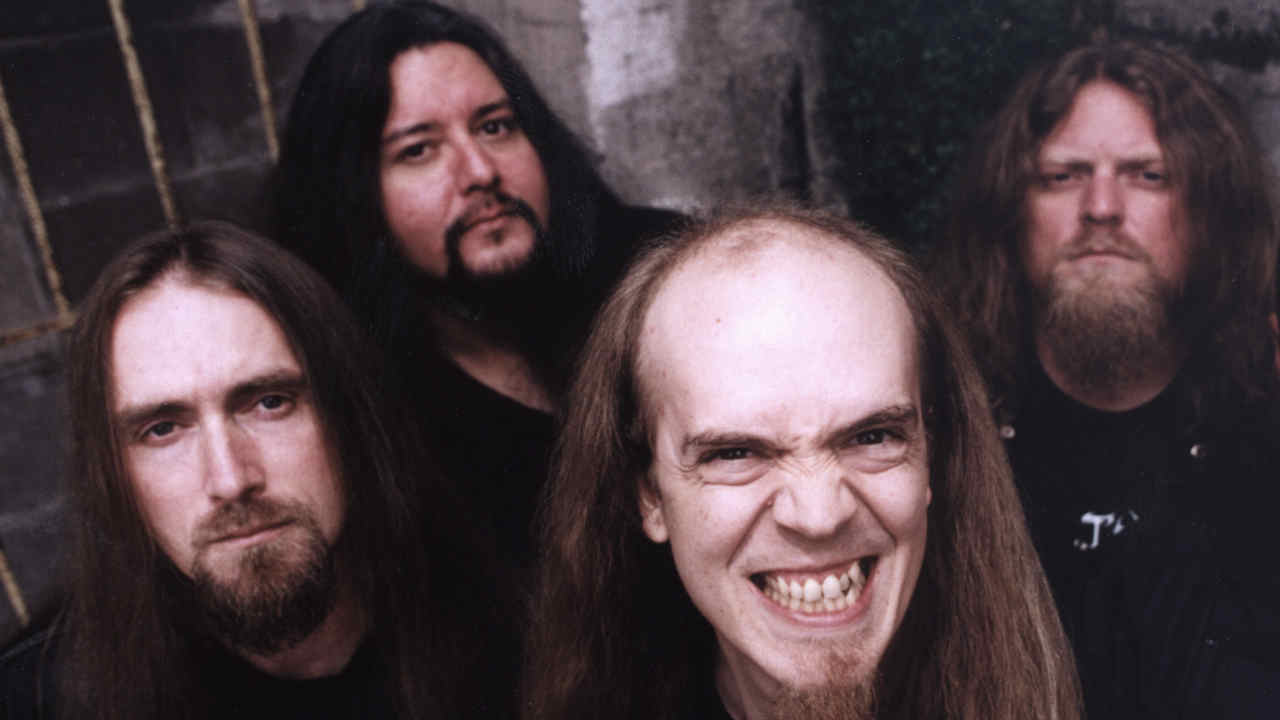What are the best earplugs for concerts in 2026? Here are my top picks as a gig-going regular
Myself and the Louder team have put a number of concert-ready earplugs through their paces to see which are the best choices
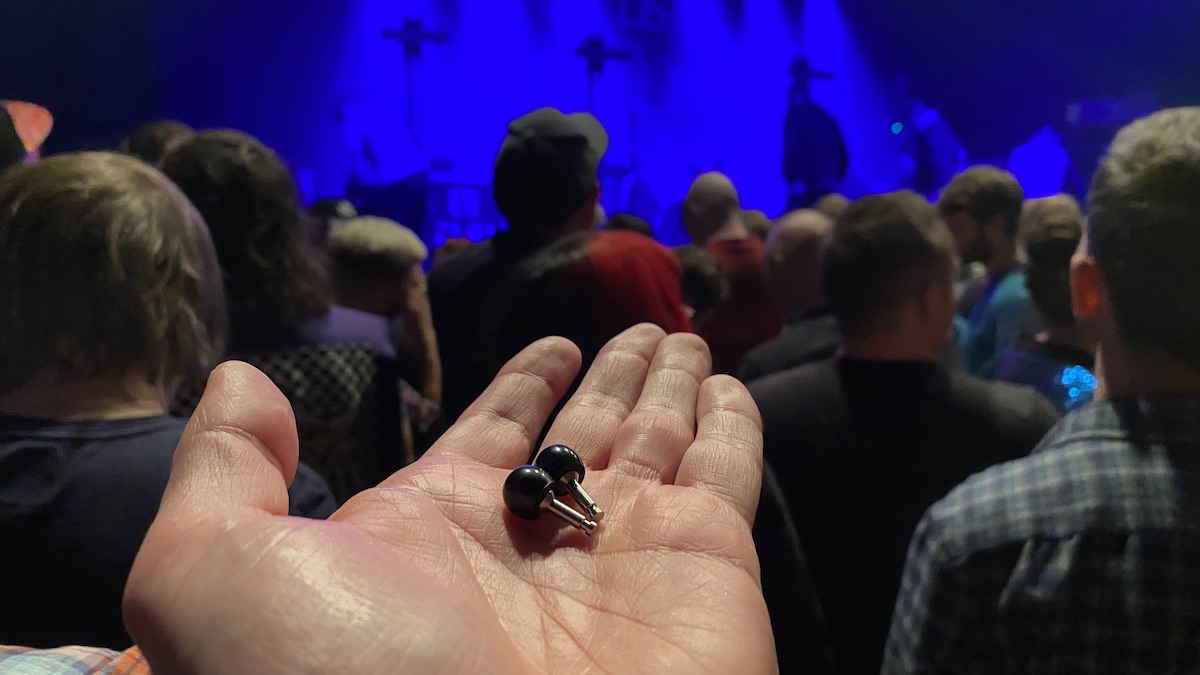
We all love live music, but none of us are immune to the effects of attending a loud gig - and that's why protecting our hearing with a pair of the best earplugs for concerts is so important.
I remember a Mogwai show at the Manchester Academy in 2008. My dad and I were standing back-right of the live desk, giddily watching as the meters started consistently redlining; the front-of-house engineers’ hands started assuming their best “it is what it is” poses, as our shirts started thrashing against our chests in the humungous push-pull of reverent noise.
To date, it’s the only gig I’ve ever felt behind my ribs. And I'm glad both of us were wearing earplugs at the time, however ill-fitting and rudimentary they were. I’ve since squandered my hearing on countless ping-y snares and feedback-y amps, in basement gigs and on both sides of the PA, but those hard-learned lessons led me back to the same essential conclusion – that hearing protection is far more than a vague inconvenience.
Loud gigs are one thing, but your hearing can be put at risk from even the most anodyne of sources. If the average volume of a traffic jam is enough to cause hearing damage over time (and it is), what else could be threatening your built-in audio fidelity? The best earplugs for concerts is an absolute must, not just to preserve your enjoyment of the loud stuff live, but also to preserve your enjoyment of any music in the future.
It's for this reason that myself and other members of the Louder team have taken it upon ourselves to test a wide range of the earplugs in a wide range of settings, from tiny dive bars to huge arenas and open-air festival sites (both in the crowd, and on the stage when performing ourselves) to compile this guide to the best earplugs for gigs and live shows.
We put our collective heads together and picked the Loop Experience 2 earplugs as out top choice, as they strike a perfect balance between performance, comfort and style.
We've also taken the time to consult with hearing experts for targeted knowledge and advice on exactly what matters when it comes to our ears. If you want to learn more about the ins and outs of hearing, and the dangers of noise, feel free to drop down to my FAQ section; if you just want to know how best to protect your ears without impacting your fun-factor, read right on.
Editor's picks
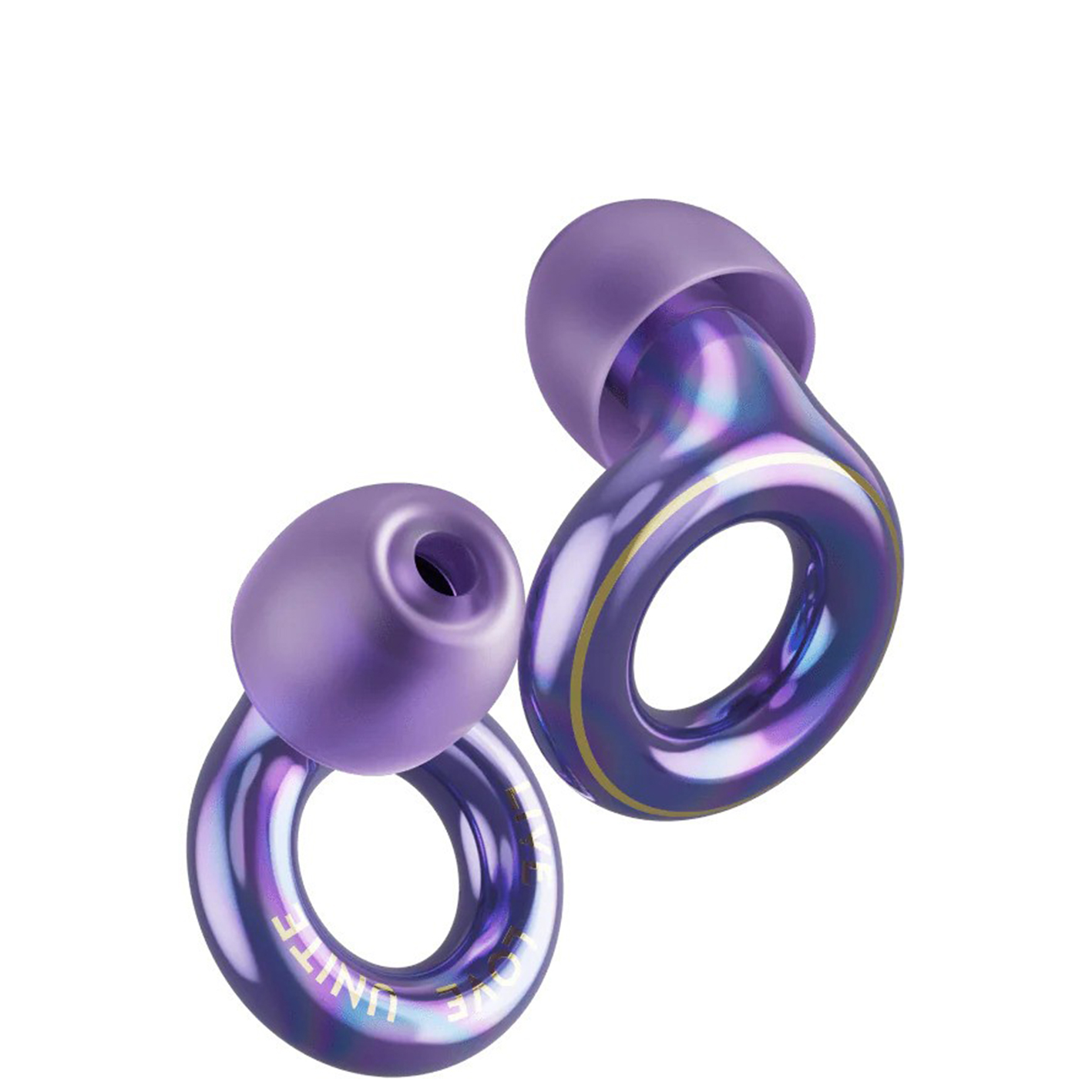
The Loop Experience 2 High Fidelity earplugs are our favourite earplugs when it comes to both performance and style. They're available in a bunch of different colours and limited editions. They'll give you 17db of protection while gigging and come with four tip sizes for the perfect fit. If you're looking for something more inconspicuous but still very comfortable, try the Vibes High Fidelity plugs (#3).
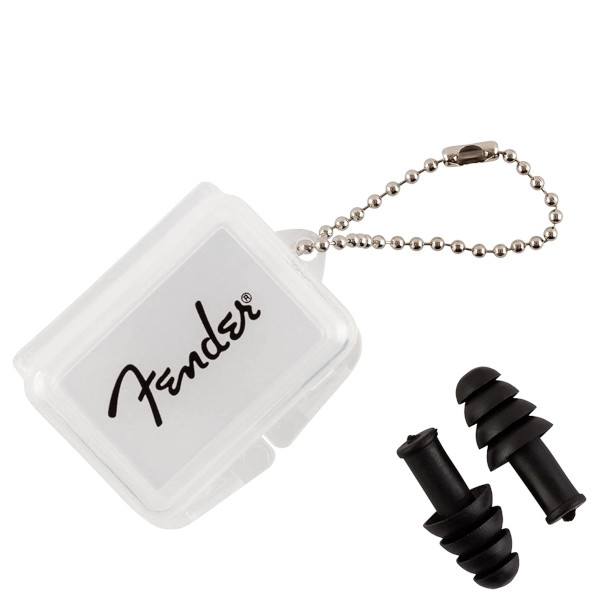
Our top pick if you're on a budget is from the guitar maestros at Fender. We found their Musician Series earplugs comfortable to wear during longer gigs and they provide up 27dB of noise reduction. They're not the best here, but they're reusable and available at a great price. If you're willing to push your budget, the Alpine MusicSafe Pro plugs (#4) are a significant step up for not much more cash.
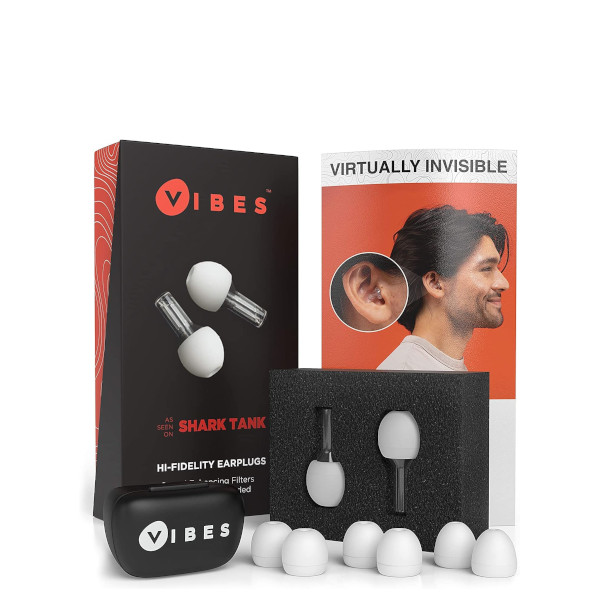
With their subtle, stylish design and suitability for loud music, the Vibes Hi-Fidelity earplugs are a great choice for live music lovers. They offer up to 22db of hearing protection and are streets ahead of the cheaper one-and-done foam models. They also look smart and, when reviewing, our tester hardly noticed they were in. Want to stand out from the crowd? The Loop Experience 2 plugs (#1) do the same job but with more flair.
Best earplugs overall
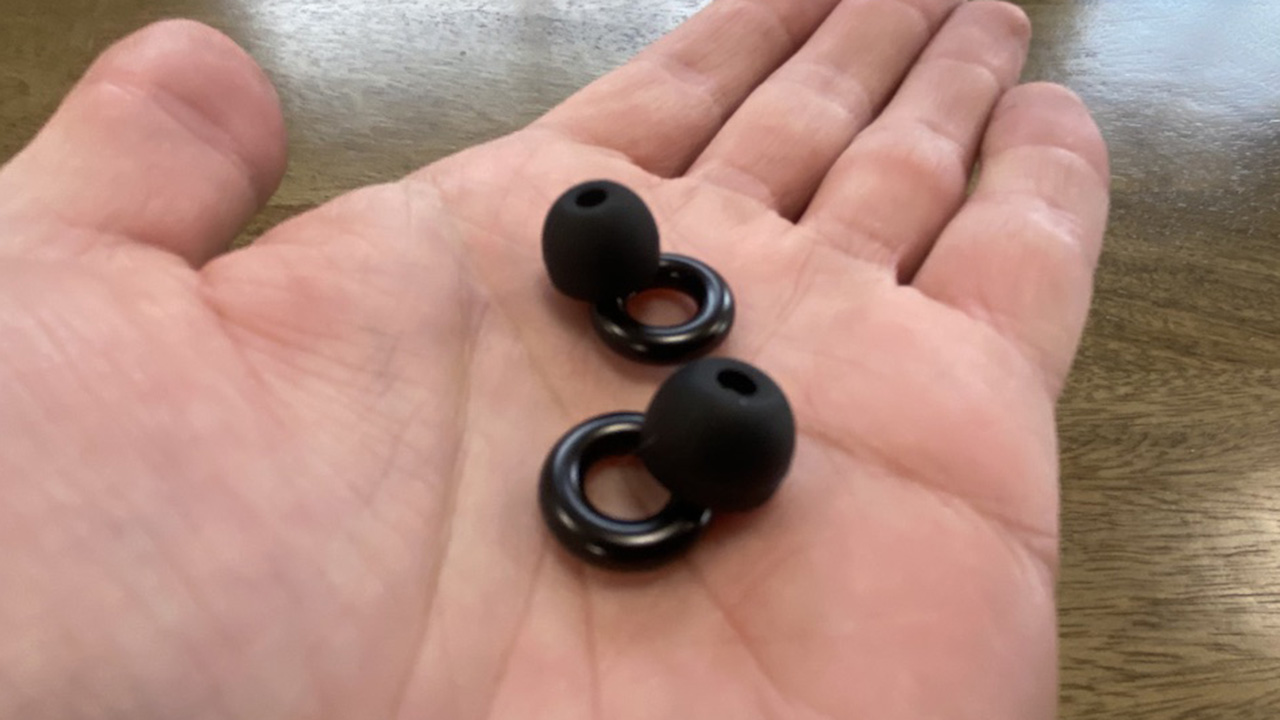
Specifications
Reasons to buy
Reasons to avoid
✅ Buy if you want a distinct set of earplugs: Loop Experience look like no other earplugs thanks to their hoop design which come in a variety of wild colours.
❌ Avoid if you want a more discreet pair: The Loop Experience may offer up to 17dB of noise protection, but their eye-catching design won’t be for everyone.
Overview: I think the reusable Loop Experience 2 High Fidelity Earplugs are the most stylish in this list thanks to their cool ‘loop’ design – hence the name. Not only do they look great, but they also come in a variety of colours to help you stand out in the crowd: Black, rose gold, gold and silver. Loop often puts out limited edition colours too. But of course the real test is what they can do to help protect you when out and about and at concerts. So, why do I rate these as the best live music earplugs overall?
Fit and comfort: The pack contains XS, S, M and L silicone tips to ensure a good fit, which is so important to the performance of the plugs. No other choices in this guide offer as many size options. Once I found my fit, these plugs stayed firmly in place, without feeling uncomfortable or giving me ear fatigue. And of course, that loop design makes them easy to remove once the gig was over. The supplied keychain carry case means you shouldn't lose them easily. It's small enough to stow in your pocket too, ideal if you're not taking a bag or coat to the gig.
In use: The Loop Experience 2 High Fidelity earplugs offer a 17 decibel reduction in noise, which isn't the highest rated here, but in my tests, I found they did a fantastic job of removing the more jarring frequencies without crushing the detail and nuance of the music. In fact, I found they helped naturally mix a muddy sound during one gig, taming the low end and bringing out more clarity in the guitars.
Verdict: In my opinion – and taking the relatively small cost into consideration – having a set of these plugs on hand for every live event is the best choice you can make right now for your future hearing health.
Test | Results | Score |
|---|---|---|
Fit | Multiple tip sizes and no ear fatigue | ★★★★★ |
Comfort | Very comfy and excellent for long gigs | ★★★★★ |
In use | Satisfying volume reduction without removing clarity and 17dB noise reduction | ★★★★☆ |

"Aiming themselves firmly at a wider audience than just musicians, Loop Earplugs are very much style along with the substance. Their unique design works impeccably well to tame even the most extreme forms of music, without costing the earth."
Read more: Loop Experience earplugs review
Best budget earplugs
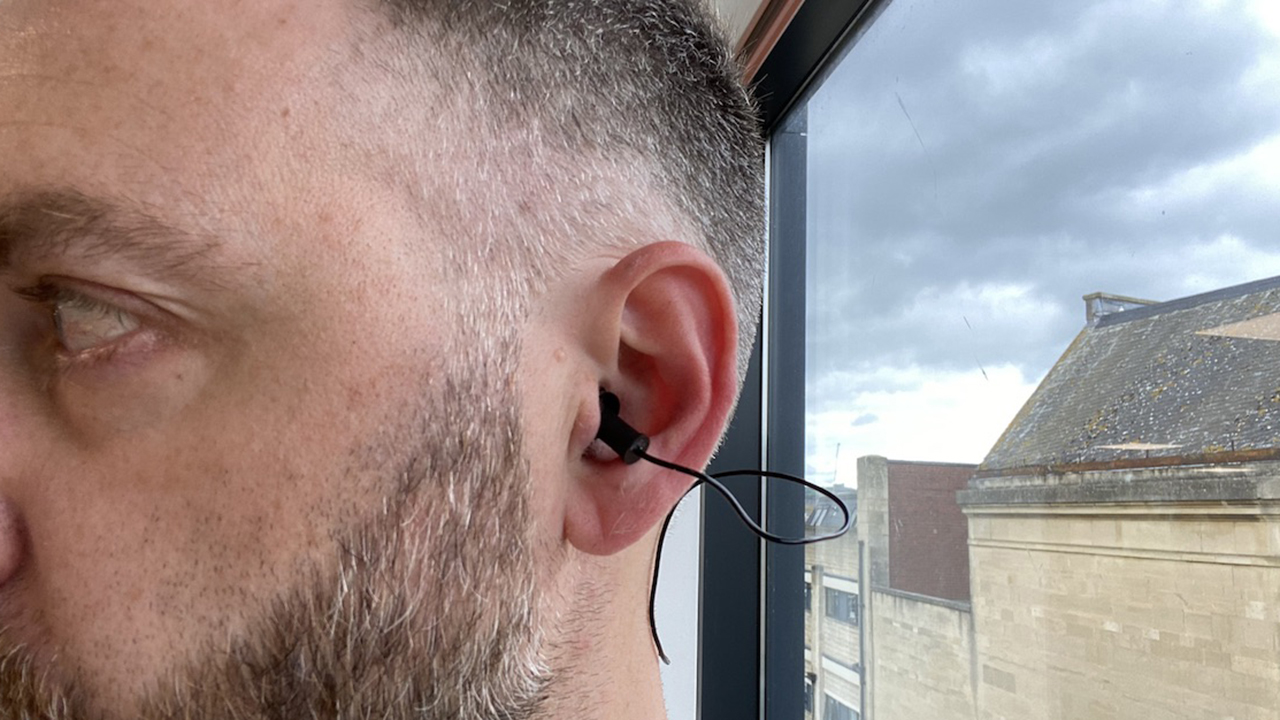
Specifications
Reasons to buy
Reasons to avoid
✅ Buy if you want budget protection from a known brand: Fender are better known for their range of guitars, but these no-frills earplugs are perfect for gig-goers on a budget.
❌ Avoid if you're after a more comfortable fit: These Fender earplugs offer great protection, to a point... but in our experience, they're not so comfy for long sessions.
Overview: This pick is from one of music’s more familiar brands. Fender's Musician Series plugs are unashamedly no-frills – hence the low price – but in my experience they're a much better alternative to the free foam plugs that are dished out at live venues.
Fit and comfort: These Fender earplugs don't come with an assortment of tip sizes, with the ridges on them used instead to try and secure a good fit. They're pretty straightforward to insert and at no time did I feel they were going to fall out. However, I did find them slightly uncomfortable after a while.
In use: The Fender Musician Series earplugs deliver an impressive 27dB noise reduction rating. I found they worked great in both a rehearsal room environment (Fender's intended use case for them) and at live shows, particularly if heavier music is your thing. Some of the audio detail was lost, but my ears always thanked me for using them the following morning.
Verdict: With their 27bB of hearing protection, the Fender Musician Series earplugs are worth considering, especially if you're on a tight budget. They’re also reusable and super easy to clean with some soapy water, but you might find their lack of long session comfort an issue.
Test | Results | Score |
|---|---|---|
Fit | No extra tip sizes, but they're secure once fitted | ★★★★☆ |
Comfort | Slightly uncomfortable for long-term use | ★★★☆☆ |
In use | Offering 27dB of noise protection on a budget, but some audio detail is lost | ★★★★★ |

"These functional budget earplugs from Fender come with musical pedigree courtesy of the legendary guitar manufacturer, and are designed to protect your hearing from the rehearsal room to the music venue – all without breaking the bank."
Read more: Fender Musician earplugs review
Best for comfort
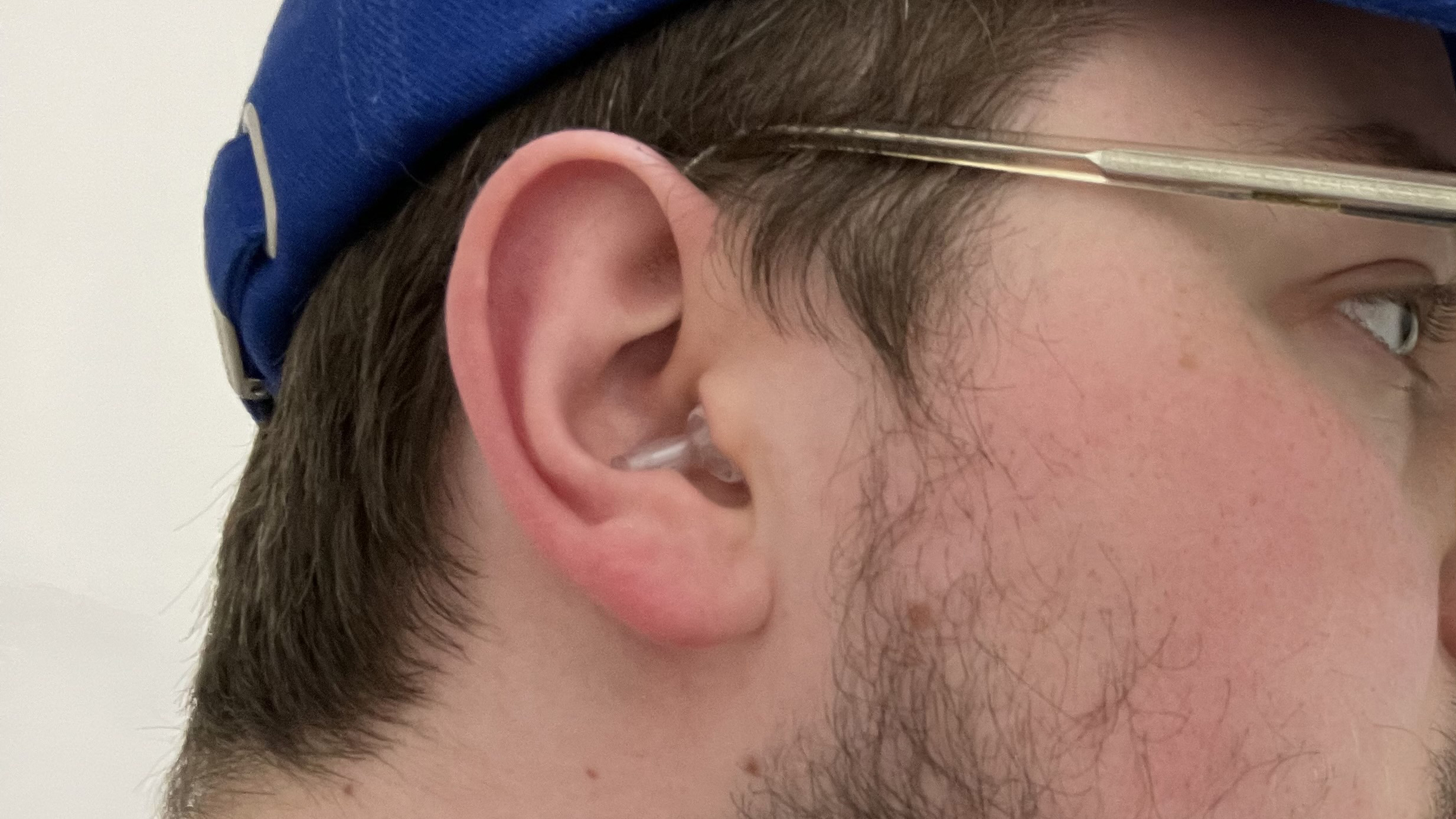
Specifications
Reasons to buy
Reasons to avoid
✅ Buy if you want a discrete set of earplugs: Vibes make excellent earplugs and their simple, comfortable design makes them a top choice for the fashion conscious.
❌ Avoid if you need more than 22dB of noise protection: 22dB of hearing protection is not to be sniffed at, but if you’re a live musician, there are better options here.
Overview: The Vibes Hi-Fidelity earplugs focus on reducing volume and use special filters to fine-tune certain damaging frequencies. The design is super cool and once they were in my ears, I found that the low profile and clear plastic housing meant it barely looked like I was wearing them – something my gig-buddies commented on. If you've been unsure about wearing earplugs because of the way they look, these could change the game for you.
Fit and comfort: During long band practices and multi-band bills, I found them to be among the most comfortable earplugs I've tested too. They're super lightweight and the soft silicone tips are very ear-friendly. The pack also comes with small, medium and large tip sizes so you should be able to find a size that works for you.
In use: These earplugs will give you up to 22dB of noise protection but during my sessions with them, I found they tended to slightly muffle sound and the top-end was lost some detail, although it wasn't too distracting.
Verdict: The Vibes Hi-Fidelity earplugs are discreet, comfortable and do a great job in protecting your hearing. Yes, top-end detail can be lost while wearing them, but it's not a deal breaker by any stretch of the imagination. They're a good price and also come with a carry case for protection - and they're reusable.
Test | Results | Score |
|---|---|---|
Fit | Three tip sizes out of the box and super lightweight | ★★★★★ |
Comfort | Soft silicone tips means excellent comfort levels | ★★★★★ |
In use | 22dB noise reduction but audio can sound muffled | ★★★★☆ |
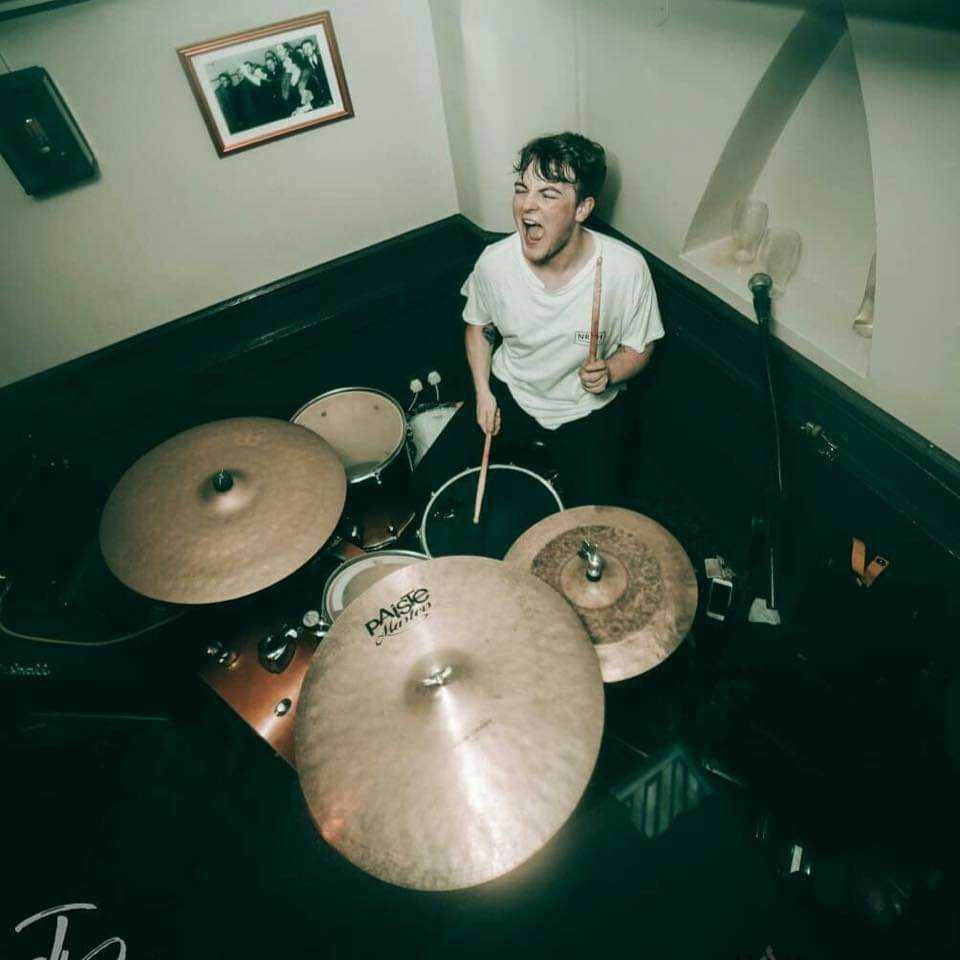
"The Vibes Hi-Fidelity earplugs are small, comfortable and discrete, and do a good job of bringing the volume down a few notches. The sound you hear might not be a crystal clear representation of the source - but we’d rather that than go deaf."
Read more: Vibes Hi-Fidelity review
Best for musicians
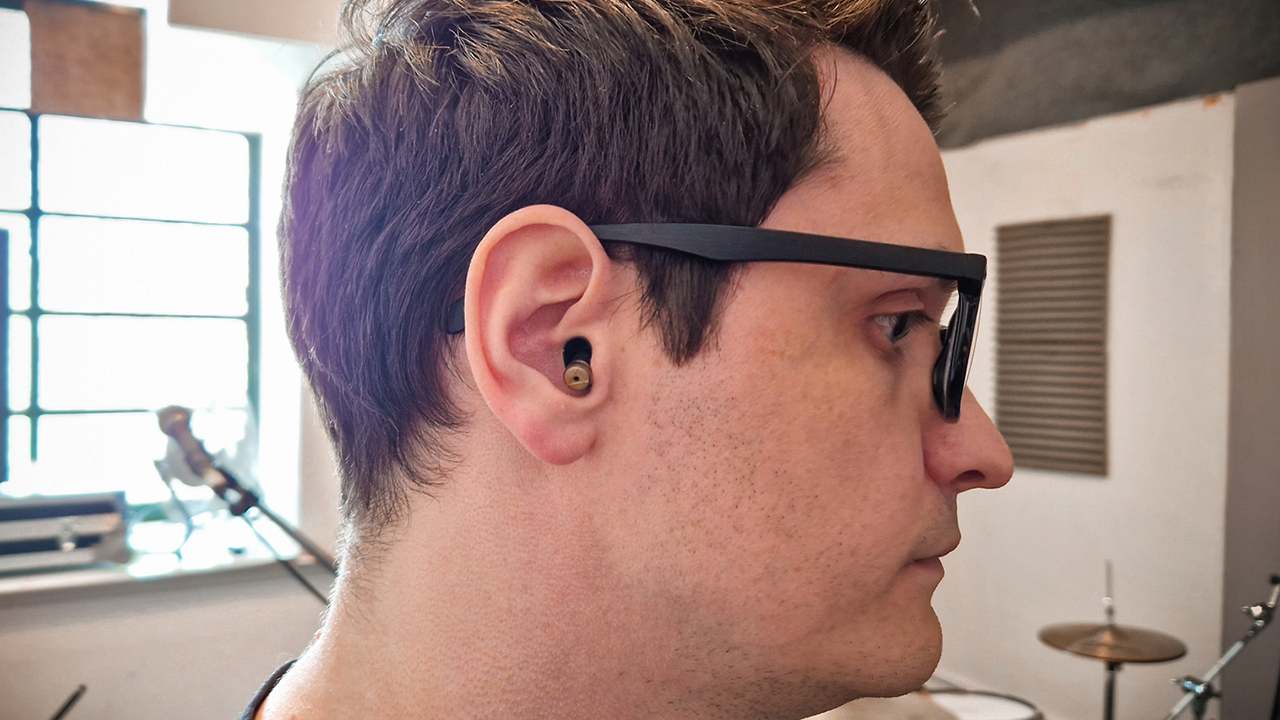
Specifications
Reasons to buy
Reasons to avoid
✅ Buy if you want a pair of earplugs for different types of events: Interchangeable filters mean you can customise your plugs to the type of event you're attending, from acoustic pub gigs, to EDM all-nighters.
❌ Avoid if you want crystal clear audio: While some earplugs will give you excellent high-fidelity sound, we found these can lose a bit of definition - although that won’t matter so much at a festival.
Overview: As one of the bigger names in ear and hearing protection, the Alpine MusicSafe Pro earplugs are well worth checking out – and they're a particularly popular choice among my fellow musicians thanks to their versatility.
Fit and comfort: The Alpine MusicSafe Pro are one-size, but I found them to provide a snug fit overall and didn't fatigue my ears as much as I thought they would. They're also pretty discrete once in the ear, which is ideal if you don't want many people to know you're wearing them. Hygiene is key to maintaining healthy ears and ensuring your earplugs last a long time (a build-up of bacteria can mean they need replacing sooner than anticipated), so I also love that Alpine includes a spray bottle of cleaning solution with these plugs to help you keep them up and running.
In use: I found the best thing about these earplugs is the interchangeable filters, making them a great fit for a variety of musical scenarios. They can cope with band practices and acoustic gigs to the full-on aural barrage of a stoner rock all-dayer. You can also select the appropriate attenuation for each gig and set them to 16dB, 19dB or 22dB. There was a noticeable drop in the low mids during one particular band rehearsal but they still provided a well-balanced sound that was much more comfortable to the ear than the unfiltered sound.
Verdict: For a pair of earplugs to offer three ranges on noise protection is fantastic and even though they didn't perform perfectly during band rehearsals, they still did a fine job. They're also comfortable, discreet, come with cleaning fluid and are available at a great price.
Test | Results | Score |
|---|---|---|
Fit | One size with filters and they feel snug in the ears | ★★★★★ |
Comfort | Great comfort levels and no ear fatigue | ★★★★★ |
In use | Interchangeable filters and 16dB/19/22dB of noise reduction | ★★★★☆ |
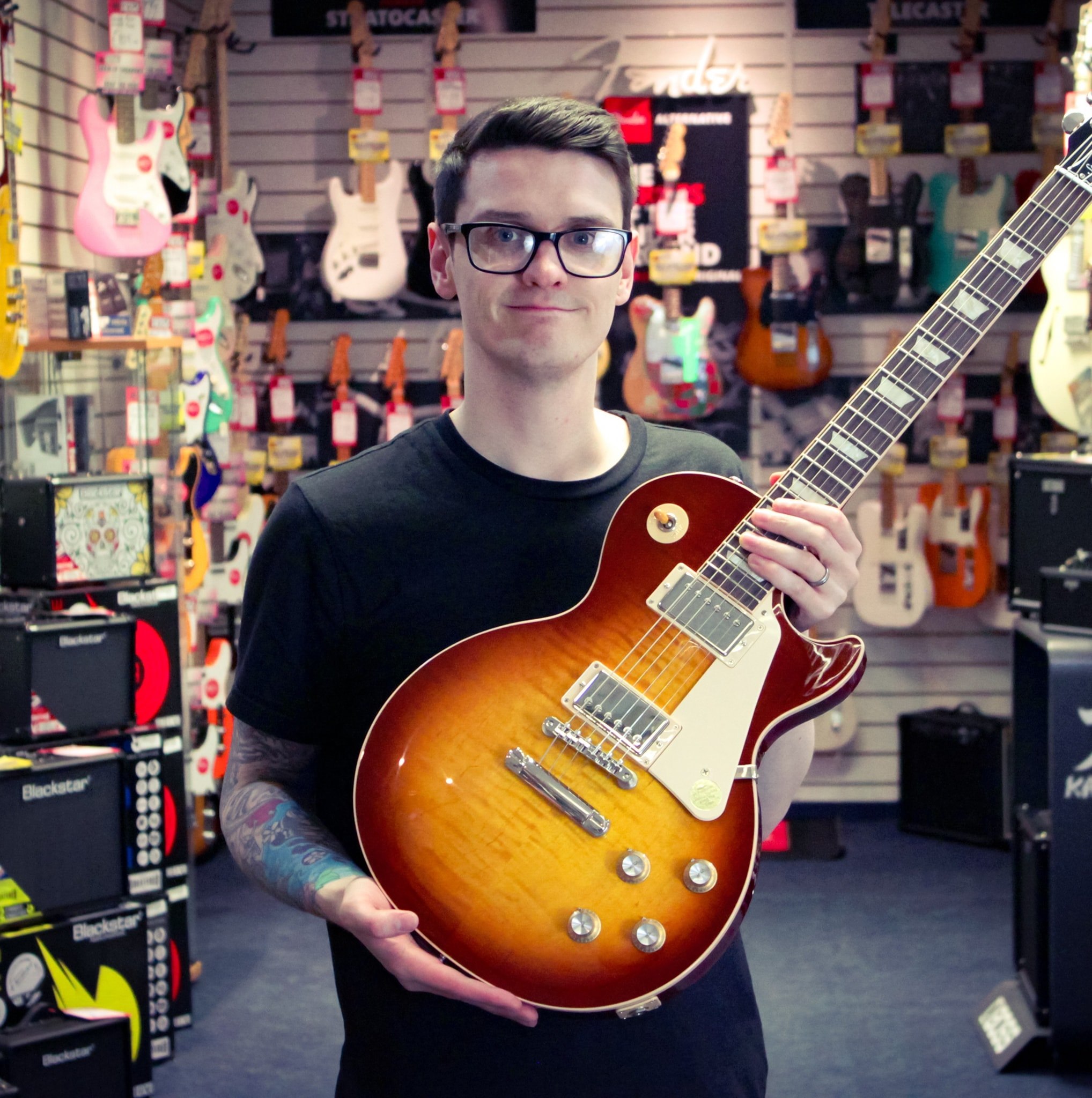
"It's clear to see why so many musos opt for the Alpine Musicsafe Pro earplugs. We found them to be a joy to wear, bringing the noise levels down to a much safer level, all while retaining the tonal characteristics of the music. Better yet, they're easily cleaned, come with useful accessories and are very affordable. With earplugs this good at this price, you really have no excuse to be risking your hearing."
Read more: Alpine MusicSafe Pro Earplugs review
Best filter options
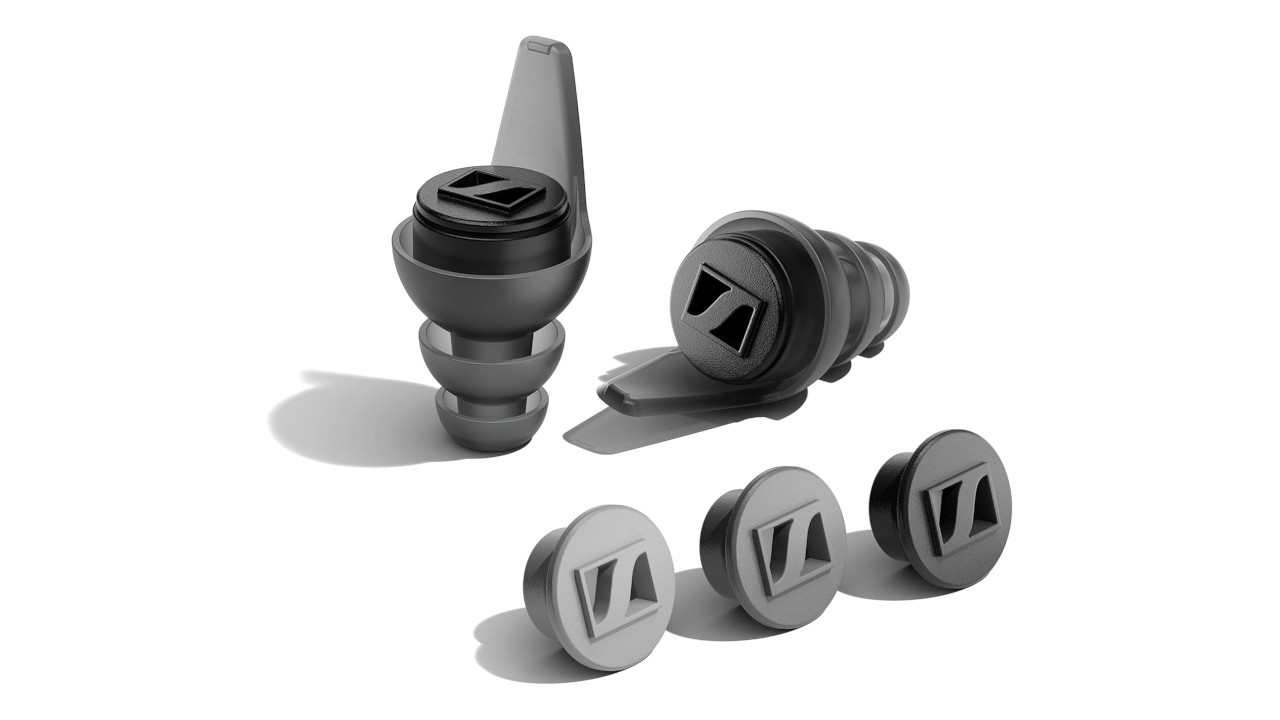
Specifications
Reasons to buy
Reasons to avoid
✅ Buy if you're a musician looking for comfort and protection: These are a top choice for musicians as they’re comfortable and offer great protection with four filter strengths.
❌ Avoid if you're looking to save a bit of money: The SoundProtex Plus are a solid set of earplugs, but if you're on a budget, other options in the list might be better for you.
Overview: Sennheiser are an easy brand to trust when it comes to audio. Between excellent earbuds and industry-standard monitoring headphones, this is a manufacturer that knows its auditory onions; nice, then, that they’ve set out their stall in the realm of sound-banishment with their SoundProtex series of earplugs. This is the SoundProtex Plus bundle, which comes with four different ‘strengths’ of acoustic filter for ultimate customisability.
Fit and comfort: The filters fit into standard-ish triple-flanged silicone earplugs, which sport Sennheiser’s familiar smoky black. These silicone plugs fit snugly and reassuringly in-ear – and if they don’t, there’s two other sizes to choose from as well. When in, they’re comfy for quite a while, if a little prone to getting slick in warmer small venues. The flanged design is a trap for ear-gunk, so regular cleaning is key for continued comfort.
In use: I found the Sennheiser SoundProtex Plus earplugs to be extremely handy as a set of daily-driver earplugs. I’m not much for swapping filters between uses, but when I did I was happy with the results; it was nice to be able to protect my hearing from drum transients at an acoustic folk show for once, for instance, by using the 10dB attenuating filter as opposed to a higher standard filter. The case is an often-underrated part, but I love the soft zip-shut case over hard aluminium, even if just for the comfort factor in my jacket’s inside pocket.
Verdict: The Sennheiser SoundProtex Plus earplugs are a little on the expensive side, but that expense is buying you a level of adaptability you’ll struggle to find elsewhere. I’m a big fan of these, and if your ear-protection needs vary from night to night, you will be too.
Test | Results | Score |
|---|---|---|
Fit | Three sizes to choose from, and snug when fitted. | ★★★★☆ |
Comfort | Not as fatiguing as other silicone plugs. | ★★★★☆ |
In use | Four changeable filters make for high adaptability. | ★★★★★ |

Sennheiser’s SoundProtex Plus earplugs are the logical conclusion to the ‘one-size-fits-all’ approach other generic-fit earplugs tend to take. In the box, you’ll find three sizes of eartip and four kinds of attenuation filter, for complete coverage of your needs. They’re comfortable, don’t come back out with any accidental ease, and do an excellent job."
Read more: Sennheiser SoundProtex Plus review
Best for kids
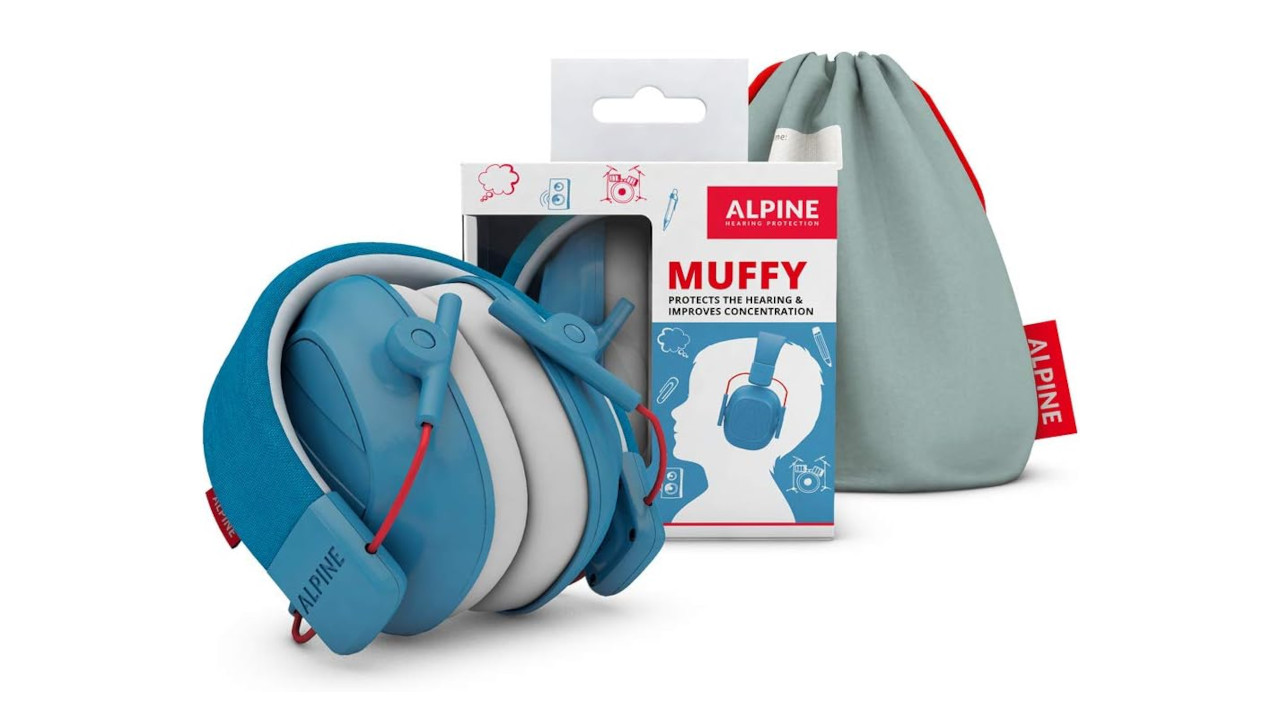
6. Alpine Muffy Kids Ear Defenders
Our expert review:
Specifications
Reasons to buy
Reasons to avoid
✅ Buy if you want a quality set of ear defenders for your child: Alpine have turned their expert attention to ear defenders and come up with the Muffy – a robust and colourful set that'll protect your kids' hearing.
❌ Avoid if your child wears glasses: The Alpine Muffy can get a wee bit uncomfortable for kids who wear glasses, as the earcups can cause pressure above the ears.
Overview: Other earplugs in this guide are not recommended for children and ear-defenders are the way to go to protect little rockers' hearing. And with more music events being held both indoors and outdoors with families in mind, the Alpine Muffy are definitely worth considering.
Fit and comfort: Their light weight and stretchy headband mean these ear defenders are particularly comfortable for young people who aren't so used to wearing headphones or ear defenders yet, but we would err on the cautious side if your child wears glasses as they can press above the ears – a common complaint with any over-ear product.
In use: The Alpine Muffy ear defenders offer up to 25dB of hearing protection and are robust enough to withstand repeated use and abuse and can be pulled and stretched within an inch of their life. They also come with a handy travel bag to keep them safe and sound.
Verdict: I love the fact the Alpine Muffy ear defenders come in so many funky colour options - and the more appealing they are to your child the more likely they will be to wear them. They're robust, are made by a company known for their excellent hearing protection products and will protect little ears well in a live situation.
Test | Results | Score |
|---|---|---|
Fit | Over-ear defenders are lightweight with stretchy headband | ★★★★★ |
Comfort | Comfort is fine, but not great when wearing glasses | ★★★★☆ |
In use | Robust design with 25dB of excellent noise reduction | ★★★★☆ |
Spec comparison
Want a clearer look at how each of our top 6 earplugs stack up against each other? Here's all the key spec side-by-side:
Earplugs | dB reduction | Materials |
|---|---|---|
Loop Experience 2 | 17dB | Silicone |
Fender Musician Series | 27dB | Silicone |
Vibes Hi- Fidelity | 22dB | Silicone |
Alpine MusicSafe Pro | 16dB/19dB/ | Thermoplastic |
Sennheiser SoundProtex Plus | 10dB/17dB/ | Thermoplastic |
Alpine Muffy Kids Ear Defenders | 25dB | Polyester |
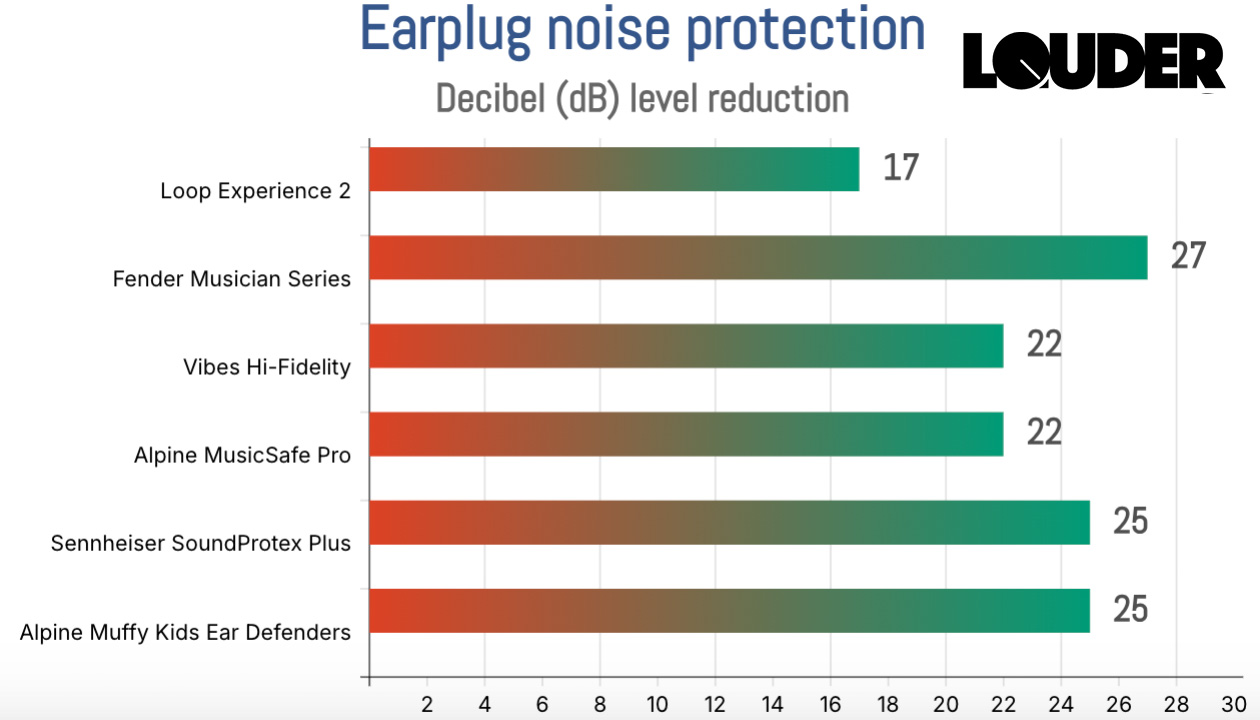
Also tested
Across the Louder team we're attending live events most nights of the week, and we're usually testing earplugs at the same time. The earplugs at the top of this guide are the ones we highly recommend, but there are many others out there worth a closer look. Here's a select few of the other earplugs we've tested recently.
Eargrace High Fidelity Earplugs
Material: Silicone| Noise reduction: 23dB | Extras: 2 sizes in the pack, aluminium case, cord, cleaning brush
Louder rating: 4/5
The Eargrace High Fidelitys stand out for a number of reasons: the combination of attenuation filters, which ensured I could hear the full musical frequency spectrum live but at a reduced volume. They also come with a number of handy accessories: a case, cleaning brush and connecting cord. As an entry point into hearing protection at a sensible cost, these are easy to recommend.
Read our full Eargrace High Fidelity Earplugs review
Senner PartyPro
Material: Silicone | Noise reduction: 18dB | Extras: Aluminium carry-fob
Louder rating: 4.5/5
The Senner PartyPro earplugs aren’t much special; this is simply another set of clear silicone earplugs with replaceable filter inserts, after all. But these are a lot more comfortable than their unassuming nature gives them credit for – and surprisingly clear as far as sound translation is concerned. I’ve used these comfortably and to great effect on both sides of the gig experience, and my hearing’s lived to tell the tale.
Decibullz Custom Molded earplugs
Materials: Thermoplastic, silicone | Noise reduction: up to 31dB | Extras: 3 sizes ear tips, 1 set max protect medium foam tips, 1 carrying pouch
Louder rating: 3.5/5
Decibullz’ brash colour scheme should make it no surprise that these self-mouldable earplugs are American in origin. Marketed just as much to sports shooters as they are to gig-goers, the Decibullz Custom Molded earplugs are all-out ear-protecting heavyweights, with up to 31dB protection. The mouldable plug is, crucially, remouldable if your ear shape changes, meaning you can keep a snug fit throughout their life. These aren’t the delicate fidelity-preserving earplugs-of-the-year, but they are an excellent choice for standing next to a drumkit with.
EarLabs dBud earplugs
Material: plastic/silicone| Noise reduction: 24dB | Extras: 5 sizes of silicone tips, detachable leash, carrying case
Louder rating: 4.5/5
The EarLabs dBud will give you two levels of noise reduction: 11db and 24dB and they come with three eartip sizes so you're guaranteed to get a good fit. They also have an in-built acoustic filter and while they tend to stick out more than some earplugs in our list, they still come recommended.
Read our full D'Addario dBud review
Earpeace Concert earplugs
Material: Silicone| Noise reduction: 25dB | Extras: Hge range of ear tips sixes and types, cord, soft case
Louder rating: 4/5
The neat Earpeace High Fidelity Concert earplugs are a great option as they offer up to 26dB protection for your lugs. They're also reusable and come with a really handy carry case which doubles as a keyring, so you need never worry about heading to a gig without them in your pocket.
Minuendo high fidelity earplugs
Material: Silicone| Noise reduction: 23dB | Extras: 2 sizes in the pack, aluminium case, cord, cleaning brush
Louder rating: 4.5/5
The Minuendo high-fidelity acoustic earplugs might be a bit more expensive than other options in this list, but we think the extra financial outlay is worth it. You can adjust noise levels between 7dB and 24dB and they come with a bunch of ear tips and flanges so you'll get a great fit to keep your ears safe - whether in the crowd or up on stage.
How to buy earplugs
There's a huge amount of earplugs on offer these days, so how do you know how to go about buying yours? Follow these simple steps to make the process easy.
1. Choose your earplugs - arguably the hardest and longest step is deciding which earplugs are right for you. We've sorted the earplugs in this guide into clear categories, which should give you a good head start.
2. Read reviews - once you have your shortlist, your next step is to read reviews. We have earplug reviews on this site which can help you make a more informed decision. You may also wish to read reviews on forums or the product pages of retailers' websites, but be advised these aren't likely to be truly impartial.
3. Choose your retailer - Now that you've got all the information on your chosen interface, it's time buy! You might have a favourite retailer, but we'd always advise shopping around for the best price.
4. Wait for a sale - If your next gig isn't for a while, it's worth holding out for a sale before you purchase to get a discount. The biggest sale of the year typically happens around Black Friday, but you'll find retailers offering discounts at various times. This could be a spring or summer sale, Memorial Day or Presidents' Day sale, or just a random flash sale.
FAQs
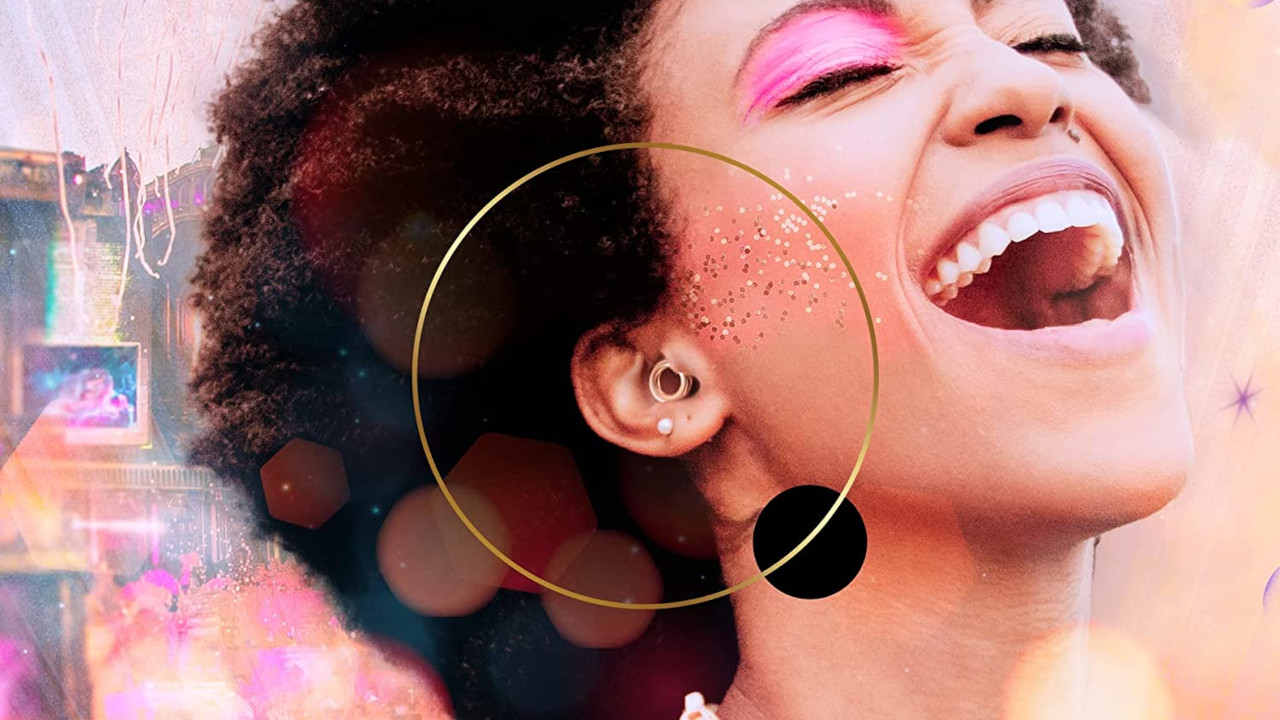
How do I choose a good pair of earplugs?
If you’re investigating in hearing protection for live music, it’s likely for one of two reasons: either your hearing is in good shape and you’d like to keep it that way, or your ears have taken a battering over the years and you don’t want to make things worse.
Whatever reason, dedicated hearing protectors are a very wise purchase for anyone who loves live music – or works in a noisy job. As with the best headphones for music, most hearing protection tends to fall into one of two brackets: over-ear and in-ear. I'm not going to dwell too much on the differences as they should be fairly self-explanatory, however in this guide I focused on in-ears for adults and a pair of ear defenders for children.
You get what you pay for with earplugs. You could put a small amount of cash into something cheap, yet ultimately disposable, or you could invest in something that will see you through many years of gigs and festivals. I have options for most budgets in this guide.
The main things you should be looking when exploring your earplug options are:
- Fit - Will the earplugs create a tight seal in your ear to optimise their performance and ability to reduce damaging frequencies? For this, you'll want plugs that offer multiple tip sizes so you can tailor the fit to your ear canals.
- Comfort - This feeds directly into comfort. Most earplugs for live music will be worn for a good few hours from the support bands right through to the encore of the main act, so ensure they don't cause any discomfort when worn over long periods.
- Noise reduction - To what degree will the earplugs impact the sound you're hearing, also know as the noise reduction rating (or NNR, more on this below). If you mostly attend acoustic events, you won't need as high a rating as you would for heavier guitar music or EDM.
Who needs earplugs?
If you attend events where the noise levels will be above the safe level (see the chart below for more on this), or you work in an environment where you will be exposed to higher than normal noise levels for long periods, then you should explore hearing protection as a priority.
Even a trip on city subway systems can be harmful, with some lines exposing the public to noise levels of 110dB.
Interim chief executive of Tinnitus UK Caroline Savage explains: “Noise exposure is the single biggest preventable cause of tinnitus, and it is clear from our research that people appear to be unaware of the risks. If you’re doing something that’s loud, even for a couple of minutes, use hearing protection. When it’s loud… plug them is our very clear message.
“We’re not here to stop people taking part in activities that they enjoy, but to make sure that they enjoy them safely. We want protecting your ears to be second nature – the same way we put on sunscreen and sunglasses in the summer or belt up when we get in the car.
"There should be no stigma around using ear plugs or ear defenders – we only have one pair of ears, and damage to our hearing is irreversible.”
It doesn't matter your age, or whether you have hearing damage already or not, anyone who uses ear protection is actively prolonging their existing ear health.
What is a NNR (noise reduction rating)?
A decent barometer of earplug performance comes in measuring the levels of noise a product offers protection from. For example, any ear protection sold in the United States must be tested according to American National Standards (ANSI), upon which it is given a Noise Reduction Rating (NRR).
However, attending a concert with a decibel level of 100dB and wearing 33dB-rated earplugs doesn’t mean the new level is 67dB. No, that would be far too simple.
Instead, there’s a formula: deduct 7 from the NRR rating and divide the resulting number by two. This is the amount of protection on offer.
So, continuing the same example; a 100dB concert would be reduced to 87dB by wearing ear protection rated at 33dB.
This graph from the Hearing Health Foundation highlights where live music sits on the noise level spectrum, and clearly shows that it's at the higher end of 'harmful'. If that's not enough to convince you of the benefits of hearing protection then we don't know what will.
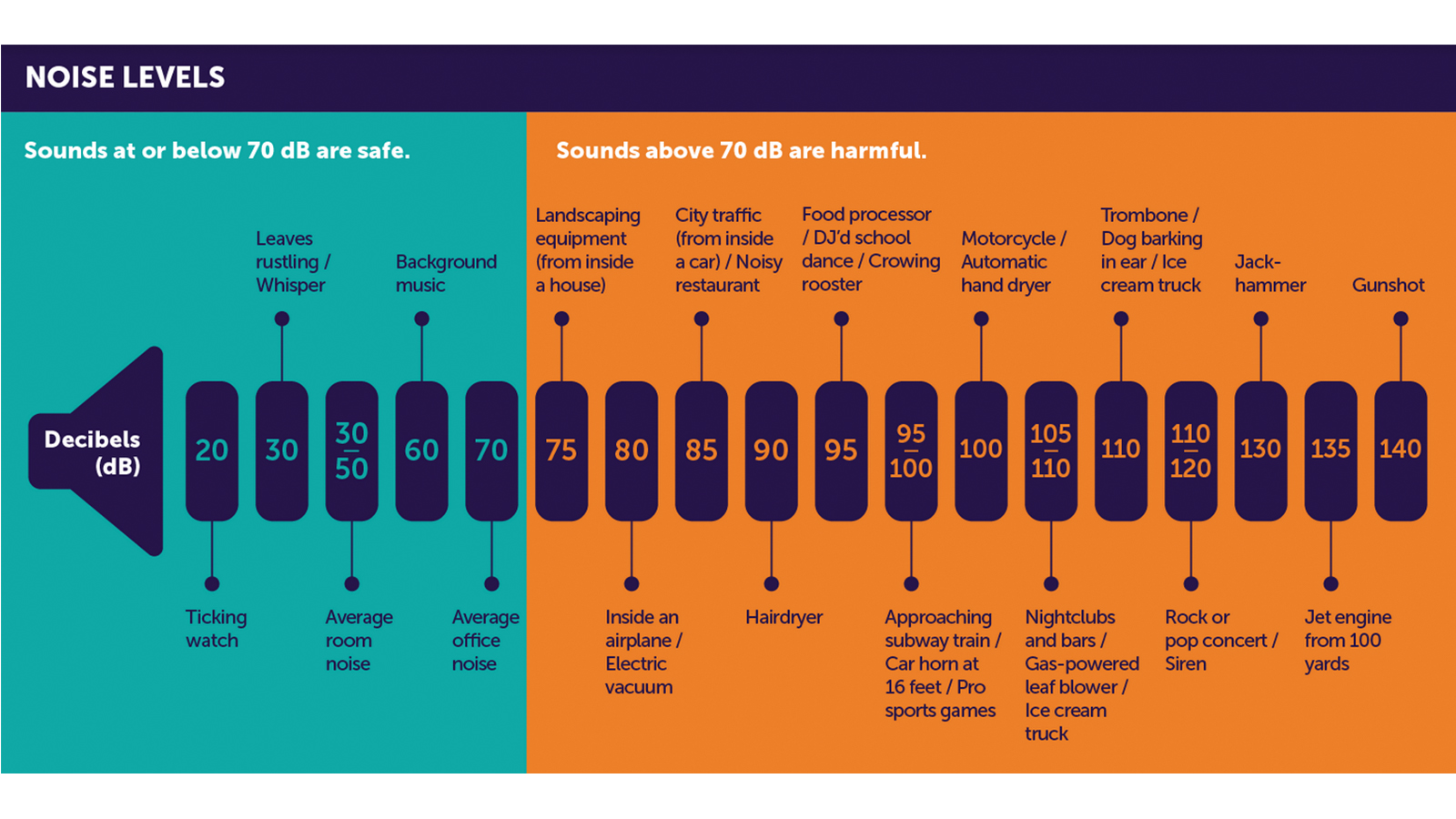
Should I get custom moulded earplugs?
With a wide range of earplugs available, there’s much talk about the benefits of custom moulded earplugs and the difference they can make when it comes to protecting your hearing, either at a live show or in the work environment.
Rather than a one-size-fits-all approach like most earplugs, like the name suggests, custom earplugs are moulded to the shape of your ear canals to provide a comfortable fit and keep unwanted noise levels out.
Some models allow you to mould each bud at home. It can be a bit of a faff to get right, but it does mean you’ll get a good fit which is really what we’re after. You can also remould them should the results not be perfect the first time around... so no worries about messing things up straight out of the box.
If you want to go that extra mile, you can visit a hearing healthcare professional who should also be able to take impressions of your ears and create moulds for custom silicone earplugs.
It’s also worth pointing out that custom moulded earplugs can be priced significantly higher than other earplugs due to their individual nature, with guidance suggesting that new ear canal impressions are taken every four years as your ears continue to grow as you get older.
Musicians often move from regular earplugs to custom moulded plugs or in-ear monitors as they start playing bigger gigs. Our friends at MusicRadar have a complete guide to the best in-ear monitors.
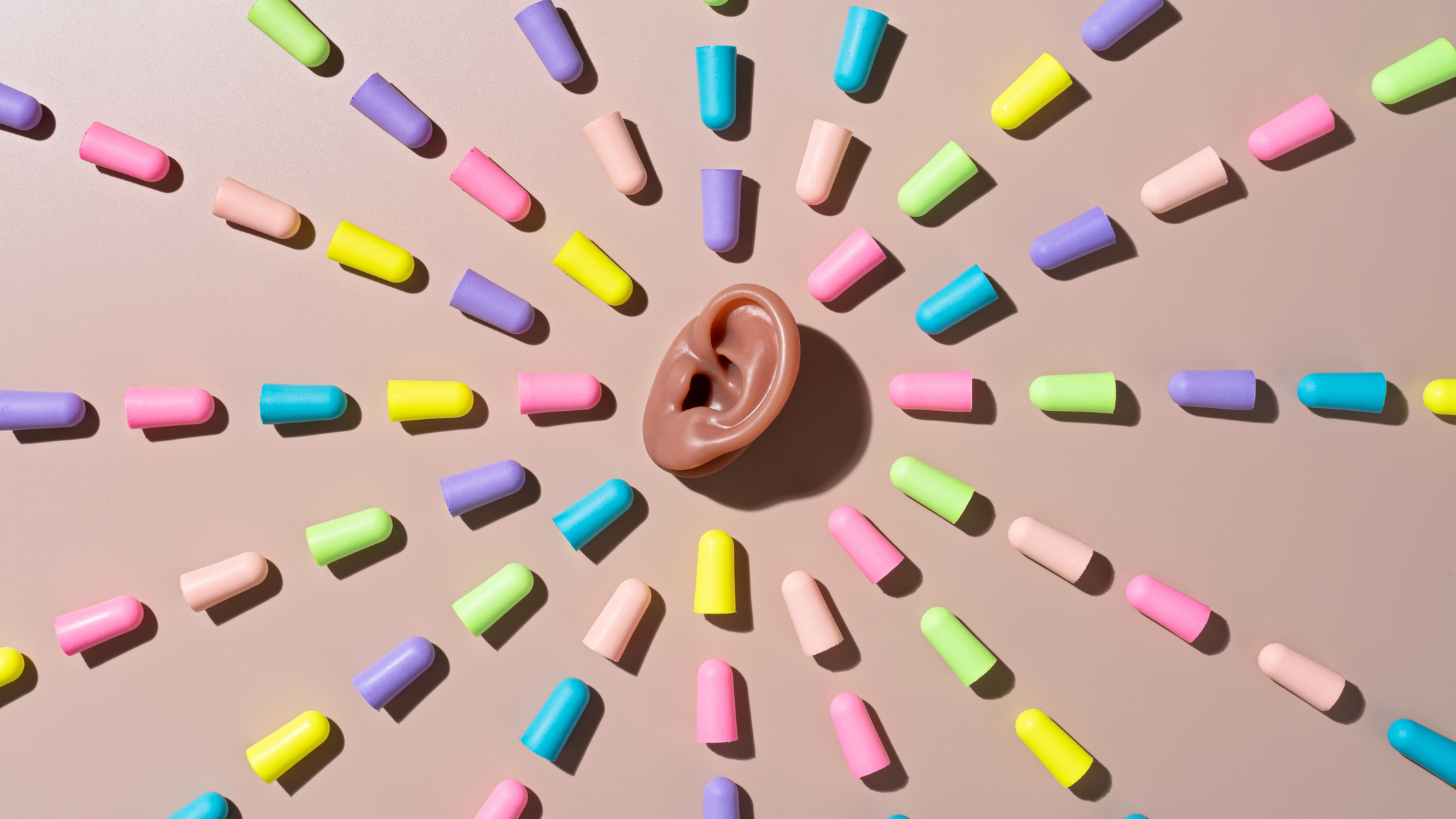
Do foam earplugs offer good protection?
In my opinion, foam earplugs should only be used as the very last resort. If you really have no other option and the venue you're at is responsible enough to offer them, then please take them. However, unlike the options in this guide, foam earplugs reduce volume, but muffle the overall sound in a very unrefined way. They're uncomfortable too, so you won't want them in for long. They're also one-use only, so don't represent great value for money.
On my concert travels, I’ve seen foam earplugs given away free at the bar, but the uptake has never seemed that high – although at a Swans/Anna von Hausswolff concert several years ago, I was only too happy to see a cup of red foam earplugs perched on in a plastic cup at the bar. In all my years of watching live music, I had never experienced music so loud, and I gratefully stuffed a couple into my lugs.
It was a memorable live event for all the wrong reasons as I couldn’t really pick out any intricacies in the music after only a short time. Even worse was that my head ached for several days afterwards and my hearing took a battering. Despite these negatives, it was that night that convinced me to invest in a good pair of earplugs and I haven't looked back.
So foam earplugs are better than nothing if you’re in a pinch, but remember that each pair should only be worn once and then disposed of. The shape will change with repeated use and they’re not the most hygienic option available.
Glossary
Decibel (dB): A unit used to measure the intensity of sound levels. For example, 20dB is similar to the noise levels in a quiet room, while 90-120dB is equivalent to the noise of an average rock concert. An increase of 10dB on the dB scale is a 10-fold increase in sound pressure levels.
Hearing Protection: Any product that blocks unwanted noise and keeps your hearing heath safe, such as earplugs, earmuffs and ear defenders.
HML: The HML rating refers to the High, Medium and Low frequency ranges offered by hearing protection products.
Noise Reduction rating (NRR): Noise Reduction Rating is a unit of measurement that lets you know how effective a pair of earplugs or earmuffs are at reducing exposure to sound. The higher NRR rating on a product, the better it will be at reducing decibels. NNR ratings are used in the US.
Single Number Rating (SNR): Single Number Rating is the European equivalent of NRR. However, it’s calculated differently and is directly aligned with European safety standards. In general, SNR ratings are 2-3dB higher than NNR figures.
Tinnitus: Tinnitus is the perception of sound where no actual environmental sound exists. For example, it could be a high-pitched ringing, a constant buzzing noise or other sounds that no one else but you can hear. Tinnitus can be temporary or take the form of a chronic health condition.
Expert advice for parents
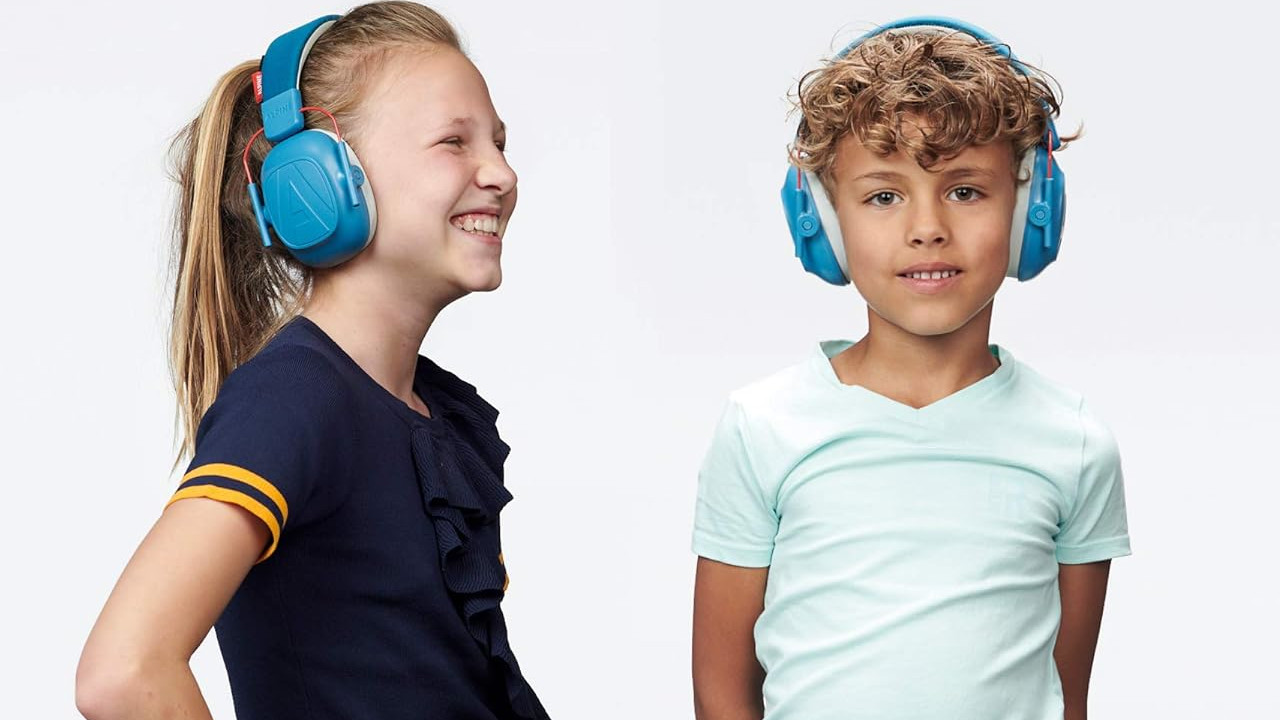
More of us are taking our kids to festivals and indoor concerts, but it's always a worry about just how loud these events will be. Investing in a good pair of ear defenders for little ones will give you peace of mind, with these over-ear devices providing a varying degree of noise protection.
It's unlikely you'll take a baby to a concert, but if going to a location where there could be music playing, a pair of ear defenders from the Banz Bubzee range is a good place to start. They cater specifically for the 0-36 month age range and come in various colours and designs. For older kids, Alpine make top ear defenders with up to 25dB of noise protection, but you'll also find many more on the market.
The American Tinnitus Association recommends building a Hearing Protection Toolkit to help prevent hearing damage in children.
They say: "The two basic styles of hearing protection are earplugs and earmuffs. Because sound waves move like water waves, hearing protection must fit like swim goggles do. Earplugs should seal off ear canals, and earmuffs should fully seal around the ears.
"In environments where noise can’t be avoided, children under age 3 should use earmuffs designed for babies or toddlers. Children aged 3 to 12 can use appropriately sized earmuffs. People aged 13 and older can use earmuffs or earplugs, depending on which fit best."
And Tinnitus UK report that tinnitus is more common in children than we might think, with research finding that that one child in 30 has "clinically significant tinnitus."
Expert advice for musicians
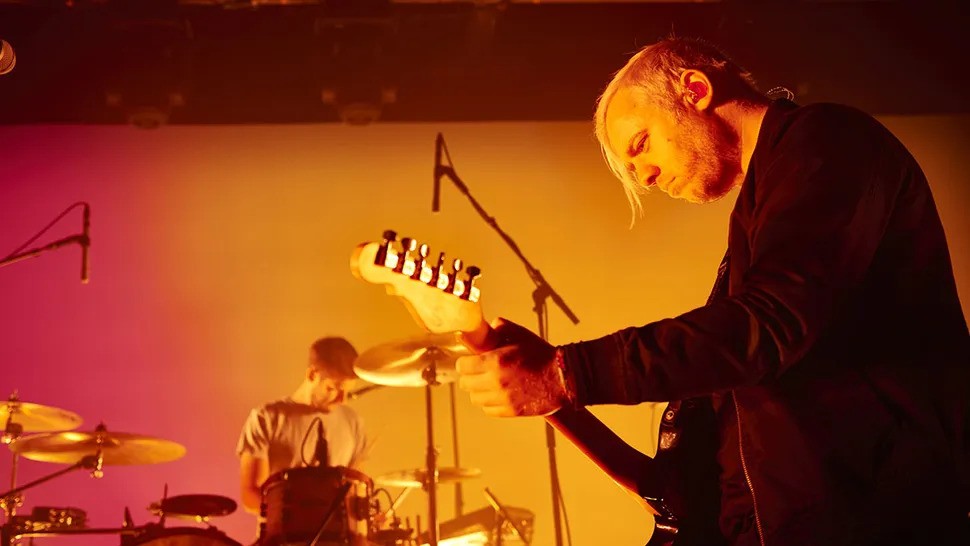
It’s not just music fans who need to look after their hearing – musicians who are constantly exposed to potentially damaging frequencies are well aware of the risk of hearing loss.
We spoke with Liam Hennessy, the head of health and welfare at Help Musicians, and Paul Checkley, who is partner and clinical director at Harley Street Hearing & Musicians Hearing Services about what steps musicians can take to better protect themselves. They both stressed the importance of preventing career-threatening hearing issues and highlighted the Hear For Musicians initiative for members of The Musicians’ Union.
Liam also spoke about the “rising issue” of hearing loss within the industry, saying: “Help Musicians is seeing an increase in the number of musicians getting in touch for help; Tinnitus UK also saw a 47% surge in those seeking help for tinnitus during lockdown.
“Speaking openly about these issues helps to remove the stigma and encourages others to seek help, as well as prompting those without symptoms to regularly check their own hearing health. We would encourage all musicians to take preventative measures to protect their hearing in order to sustain a long and healthy career in music."
Paul added: “The key here is to ensure your hearing is protected. There are now special flat-response musicians earplugs, which reduce the level of the music entering the ear but maintain the fidelity by attenuating all frequencies to the same level. Most standard earplugs attenuate more high frequencies, which can result in a dullness of sound and make speech difficult to understand. The flat response plugs simply reduce the volume without affecting the sound quality.
“If you are struggling with tinnitus there are a number of techniques and therapies that can help. The best place to start is with your GP who should be able to direct you to someone who can help.”
For more advice and a list of earplugs we've tested in the studio and onstage, visit our guide to the best earplugs for musicians.
Why trust us
Louder’s reviewers are a collective of music fans and musicians who have been attending and performing gigs since the 80s – from the noisiest AC/DC stadium shows to ear-splitting club shows – we know first-hand how bad gigs can be for long-term ear health. Between them, the Louder testing team have attended thousands of live music events over the last 5 decades – we've brought together their expertise to test, review and pick out earplugs that they rate for this guide.
Some of us are also musicians – including gigging drummers and guitarists – who have spent more time than we can remember squeezed up against Marshall stacks or ear height with a ride cymbal. We know the impact this activity can have on your ears when you don’t use protection, and we know the protection that works best.
How we test earplugs
With so many earplugs on offer on sites like Amazon it can be hard to work out where to start. That's where we come in. We filter out the generic products and focus only on brands we know and trust. Then we look at headline claims about noise reduction, plus any features that would be beneficial to live music lovers, such as a carry case.
From here we draw up our shortlist and then contact manufacturers to call in samples for testing – often multiple samples so a number of team members can try them out without sharing the same pair, which is a hygiene no-no!
All the earplugs we test are put through their paces at live events, in the rehearsal room and out and about to be sure the ones we recommend are up to the job.
We’re constantly updating our guide as new products drop onto the market, and we will always strive to bring you what we consider to be the best earplugs for gigs.
The Louder earplug editorial review process is completely independent and not influenced by third parties. Our review samples are sourced directly from the manufacturer or purchased via a retailer.
We’re music fans here at Louder, therefore, we test our earplugs in the only proving ground we know – live music venues and band rehearsal rooms.
Our testers evaluate the earplugs in the following categories:
- Comfort and fit
- Performance
- Features
- Build quality/materials
- Design
- Cost
This enables us to produce accurate, well-balanced and real-life reviews to help you easily figure out whether the plugs you’re interested in are really the best choice for you.
Our testing criteria in detail:
- Comfort and fit - In this category we test how easy the earplugs are to insert and whether they stay put over time, including movement tests from basic head turns and conversation to vigorous headbanging. Do the earplugs come with multiple tips to allow for an optimal seal or if they're one-size, does this work for the different ear canal sizes of our team members? Are the earplugs comfortable for long periods of wear or do they fatigue the ears quickly?
- Performance - Music is incredibly important to us, so we want to know how little or how much the earplugs colour the sound of our favourite artists, whilst still removing those damaging or jarring frequencies that can lead to hearing loss.
- Features - What else comes with the plugs? Do they include a carry case, a cord to connect the earbuds together, or any cleaning products?
- Build quality/materials - In a nutshell, are they built to last, or will repeated uses lead to rapid degradation in performance?
- Design - These are items we will be wearing out and about, amongst our peers, so we also assess how stylish and discrete (or not) each pair of plugs is. Aesthetics are subjective, but we aim to give our take in balanced way.
- Cost - We assess each pair on all the factors above, before deciding whether the cost is justifiable.
Read more about how we test earplugs here.
Meet our experts

Chris Corfield is the main author of our best earplugs for concerts guide and comes with a wealth of experience when it comes to writing about everything from guitar gear, synths and mics, to putting music production hardware through its paces. After 12 years covering all aspects of music, he knows how important it is to look after his hearing when testing products.

Louder's eComm Editor Scott Munro, who maintains this guide, doesn't suffer from tinnitus, but now wears earplugs regularly after a torturous experience at a live concert several years ago which sparked him into action to do more to protect his hearing.

Chris Barnes is the eCommerce Editor for Guitar World, MusicRadar and Louder, and is also a drummer. With the sound of crash cymbals permanently ringing in his ears after 20+ years of playing, and with 26 years of attending and playing live gigs under his belt, he knows the importance of quality ear protection and has used everything from free foam earplugs to custom moulded in-ear monitors.

Metal Hammer editor Eleanor Goodman has been living with tinnitus since she was a teenager and has relied on earplugs when attending concerts and festivals and has spoken about the importance of looking after her hearing and how she deals with the issue.

James Grimshaw is a freelance writer and music obsessive with over a decade in music and audio writing. They’ve lent their audio-tech opinions (amongst others) to the likes of Guitar World, MusicRadar and the London Evening Standard – before which, they covered everything music and Leeds through their section-editorship of national e-magazine The State Of The Arts. When they aren’t blasting esoteric noise-rock around the house, they’re playing out with esoteric noise-rock bands in DIY venues across the country; James will evangelise to you about Tera Melos until the sun comes up.
Latest updates
05/06/24: New product entries have been added to the guide as part of this update: Sennheiser SoundProtex Plus, Senner PartyPro and Decibullz Custom Molded Earplugs. We've also added a spec comparison table, alongside a graph showing the levels of decibel protection for all the earplugs featured in the guide. In addition, a glossary has been added highlighting key terms surrounding earplugs and hearing health. These new sections are all geared up to help you make an informed choice.
03/07/24: Our product entries now go into more detail on fit, comfort and performance and we've started to give star ratings for each of these categories, in addition to an overall star rating. We've also streamlined the usability of this page.
31/05/24: This guide has been completely overhauled. We've assessed and streamlined our product choices to make it much easier to find the right earplugs for your needs. We've also added more clarity on each of our choices and gone into more depth with our buying advice and testing methodology.
Read more
You can trust Louder
- How to keep your earplugs clean so you can use them time after time
- 5 things to consider when investing in a pair of earplugs
- How often should you replace your earplugs?
- Living with tinnitus: "We all love music – why would we want to lose that?"
- 5 reasons why it's time to start wearing earplugs at gigs
- Loudness explained: Volume and decibel levels defined for live music fans
The latest news, features and interviews direct to your inbox, from the global home of alternative music.
Chris Corfield is a journalist with over 12 years of experience writing for some of the music world's biggest brands including Orange Amplification, MusicRadar, Guitar World Total Guitar and Dawsons Music. Chris loves getting nerdy about everything from guitar gear and synths, to microphones and music production hardware.
- Eleanor GoodmanEditor, Metal Hammer
- Chris Barnes
- James GrimshawFreelance writer
- Scott MunroLouder e-commerce editor
